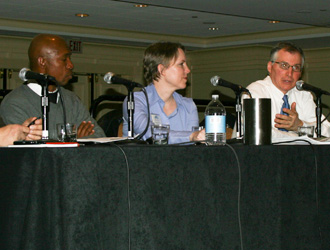
On Wednesday, March 13, the American Bar Association Rule of Law Initiative, or ABA ROLI, hosted a conference on emerging issues in the rule of law. Panelists from ABA ROLI, international development organizations, the U.S. government, and U.N. agencies covered topics including the effects of the “youth bulge” – when populations are comprised of a large share of children and young adults – on democracy and governance promotion, human rights accountability for extractive industries, NGO’s use of technology to fight corruption, and structural gender-based discrimination in health care systems. Audio highlights from the day can be accessed here.
At the panel on youth and the rule of law, panelists discussed ways to transform demographic developments such as the “youth bulge” in developing countries into opportunities to promote the rule of law and encourage the youth to embrace pro- democracy and governance values. One of the three panelists, Charles-Guy Makongo, is the country director for the Democratic Republic of Congo for the ABA ROLI program. Congo is home to the deadliest conflict since World War II and has earned the reputation as the rape capital of the world. Considering that over 60 percent of the population is under 20 years old, investing in Congolese youth could make a lasting impact in the country’s future. “The child is the father of the man,” said Makongo, indicating that people's personalities form when they are children and therefore youth educataion is crucial in the formation of future leaders. ABA ROLI program in Congo’s mission is to empower future leaders to foster understanding and find a solution for sustainable peace in Congo.
In the panel, “Human Rights and Extractive Industries: Protecting Rights, Empowering Communities and Promoting Sustainable Development,” panelists agreed that if accountability mechanisms are strengthened and community engagement expanded, multinational enterprises, or MNEs, could mitigate human rights violations frequently committed in poor states with weak governance. The proliferation of multilateral guidelines such as the U.N. Global Compact and the OECD Guidelines for Multinational Enterprises, and national legislation such as Dodd Frank and the Alien Tort Statute in the U.S., are closing the jurisdictional gap that MNEs committing human rights abuses abroad formerly relied on. However, the effective implementation of these principles demands disseminating knowledge of standards throughout the MNE’s organizational structure, creating human rights due diligence mechanisms, and developing legitimate processes whereby human rights complaints can be heard and remedied by the company.
If extractive MNEs fail to comply with these guidelines and laws, they face significant risks to the health of their business. Obviously, if found guilty by an extraterritorial judgment of committing or aiding and abetting human rights abuses, they face monetary damages. And although these ruling happen infrequently, companies accused of human rights abuses face severe reputational risks, which can negatively affect everything from recruiting top talent to customer loyalty to exploring and developing new resource deposits. To further ensure the protection of human rights at extractive sites, the legal community should work to improve the bargaining position and legal education of the local community affected by extractive projects. By addressing emerging issues in the rule of law, the ABA ROLI conference engaged diverse stakeholders in thinking critically about how the law can promote development and protect human rights around the world.
Photo: Panelists discussing Youth and Rule of Law; Credit: American Bar Association Rule of Law Institute

